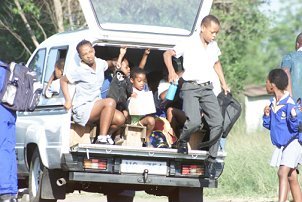|
KZN Department of Transport Cares. Save Our Children, says Head of Transport
It is true that heightened enforcement by the KwaZulu-Natal Department of Transport against illegal bakkie operators has caused a stir. That is why on 17 September about 500 protesters, including parents, learners and bakkie operators marched to the provincial legislature in Pietermaritzburg and handed over a memorandum demanding an end to enforcement against illegal bakkie operators. Presenting the memorandum on behalf of the protesters, Mr. Cyprian Dladla said it was of great concern to parents and bakkie owners that their vehicles were still being impounded by the Transport Departmentís specialized Public Transport Enforcement Unit (PTEU). According to the National Road Traffic Act of 1996 it is an offence to transport any person for hire and reward in a bakkie. More than 10 000 road crashes in KwaZulu-Natal involving bakkies alone were reported from January to June this year. As a result, 124 people died, 715 were seriously injured and 2 218 were slightly injured. Many of them were innocent young children.
So how can government continue to allow our citizens, and especially our children to be killed like this? Is it not our duty to protect them? In fact we have always been policing people who operate bakkies like we have done to other motorists. This is our mandate. What is different now is that we are stepping up arrests due to statistical data presented to us by our law enforcement unit. It must be borne in mind that the Department of Transport has a constitutional obligation to protect the citizens of our province. Hence, the launch of its PTEU and Operation Shanela, which is a highly specialized unit created to assist with the regulation of the public transport industry in KZN. It was this unit which was asked to respond to complaints by members of the public about the bakkie transport service. One must recall that we have the Mpimpa Hotline (086 221 1010) through which we receive complaints about abusive conduct and life-threatening practice on our roads on a daily basis. Some drivers were reported to be driving with tail-gates open, others were not roadworthy, and the public also complained about over-speeding, as well as children alighting from the bakkie whilst in motion and consequently being knocked down by oncoming vehicles as well as drunken driving. In just over a week (30 August to 9 September 2004), the Public Transport Enforcement Unit achieved the following results:
It is worth noting that the above figures exclude enforcement operations carried out by local authority traffic agencies such as Durban Metro Police and others. In terms of Section 22 of the National Land Transport Transition Act, "scholars" fall under a special need category of passengers. The KZN Transport Department has developed a scholar transport strategy as part of the KwaZulu-Natal Provincial Land Transport Framework. During the development of the scholar transport strategy the following realities were identified:
The following strategies were proposed to deal with the above issues. These included a long term strategy to develop an Integrated Transport Plan with special emphasis on scholar transport. There is also a medium term approach that seeks to develop a provincial scholar transport strategy in conjunction with all relevant stakeholders such as the Department of Education, Municipalities, as well as the taxi and bus industries. The short-term strategy was to facilitate the formalisation of the scholar transport industry. Guidelines for the formalisation and legitimisation of scholar transport operators (those with legal vehicles) have been completed. These include registration with the public transport registrar, obtaining permits from the Public Transport Licensing Board, etc. It is important to emphasise that this process covers only operators using legal transport modes such as buses and kombis (and not bakkies). As far as government is concerned, it is, to say the least, inappropriate that people should protest against the senseless and merciless killings of our precious children? KwaZulu-Natal MEC for Transport, Safety and Security, Mr. Bheki Cele has called upon us to defend the weak. In less than six months into his new portfolio, Mr Cele has clearly demonstrated his determination and political will to ensure that this happens. As an interim measure, we are saying the vans must stop working completely and must be replaced by mini buses (kombis). The kombi does not have to be registered as a taxi. The operator must sign an agreement with the school principal and then approach the transportation board for approval, who would then allow the kombi to transport school children if it is roadworthy. Moreover, the taxi industry has agreed to help in this regard. They are willing to transport children. Parents must approach the taxi associations to intervene. For the sake of our children, let us unite and put an end to this massacre by refusing to allow them to be transported in illegal and unsafe modes of transport. The KZN Department of Transport cares. Let us save our children.
|

